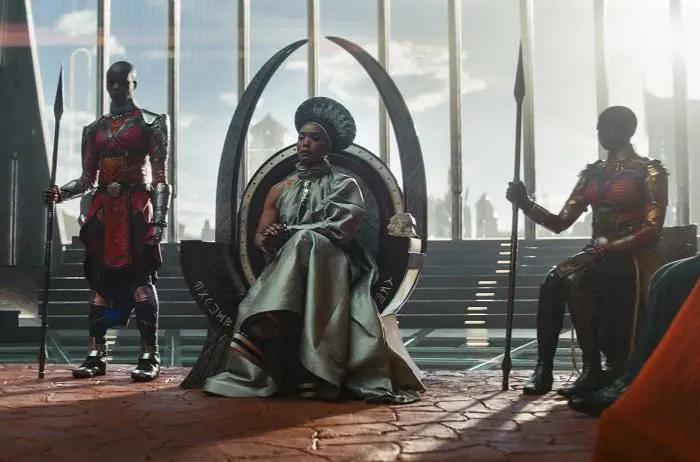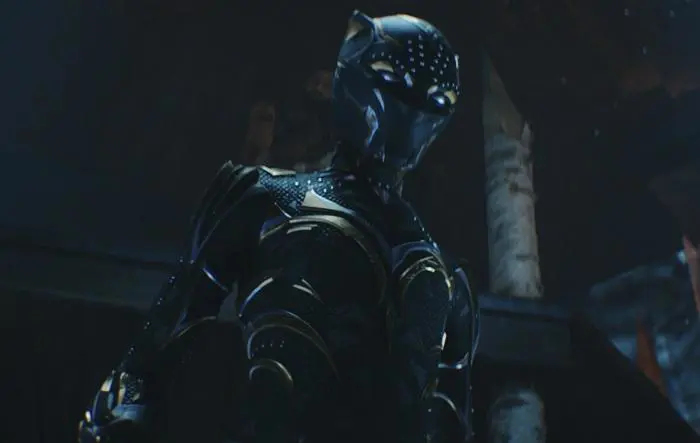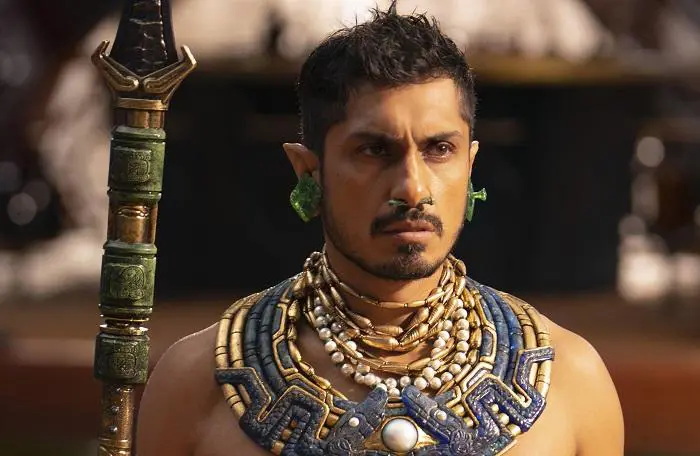'Wakanda Forever': An appropriately poignant tribute to a Marvel legend
Devon Thomas
23 November 2022 | 10:00Marvel successfully pulls off the near impossible task of paying tribute to Chadwick Boseman while pushing the Panther's lore forward.
REVIEW
Contains no major spoilers.
When Marvel announced that it was continuing with the Black Panther franchise after its star, Chadwick Boseman, passed away in 2020, fans were divided on whether or not T’Challa should be recast or if Marvel’s head, Kevin Feige, should take on the enormous task of acknowledging Boseman’s death in the overall cannon of the Marvel Cinematic Universe (MCU).
Though I wasn’t personally invested in the debate – my feelings over the MCU are casual at best – I did think that there was merit to both sides.
On the one hand, recasting T’Challa makes sense, particularly from a financial point of view and was probably the easier way to continue the Black Panther saga.
On the other hand, given Boseman’s synonymy with the Black Panther, recasting T’Challa would, 1) be an extremely difficult feat to accomplish, and 2) would’ve felt a little off – kind of like there was an elephant in the room and no one was addressing it.
Like it or not, even if he’s just a character in a franchise, Chadwick Boseman is T’Challa, so recasting T’Challa could have very well come across as dismissive at best and disrespectful at worst.
Not only did the world adore Boseman as the MCU’s Black Panther, but so did everyone working on the film, most of whom returned for the sequel.
As such, though it may have been perceived as being the riskier option, choosing to acknowledge Boseman’s death by giving him, as T’Challa, a proper send-off in the Universe makes the most sense overall.
And so, Feige and the mastermind behind the MCU’s Black Panther, Ryan Coogler, set out to tackle the impossible, reworked the original screenplay for Black Panther II by having T’Challa die prior to the sequel’s events, and birthed one of the Universe’s strongest films to date, Black Panther: Wakanda Forever.
I’ll be completely transparent with you, when I went to the Johannesburg premiere of the film on 9 November, not only was I underwhelmed, but sometime during the latter portion of the first act I fell asleep, effectively missing a good two-thirds of the film.
This wasn’t entirely due to the film: I was tired, it had been a very long day, the theatre was dark and comfy, the crowd was relatively tame, and I really didn’t like how the film was marketed. Everything was against it. I’m not going to lie.
This led me to give it a preliminary rating of 6/10 because from what I saw, I wasn’t really moved by it.
See, the film was aggressively marketed as a tribute to Boseman and that seemed to be the major talking point from literally everyone who spoke about Wakanda Forever at the premiere and it rubbed me the wrong way.
I’m not saying some of it felt ingenuine, I’m just saying that it felt overdone. Like, surely Wakanda Forever was about more than just its star dying?
Nevertheless, I was certain that my mind would change after seeing the full film because I did like most of what I saw, so I decided to not only watch it again but to sit with it a little.
Sure enough, I went from feeling slightly icky about the marketing and a little underwhelmed about the film to standing firm in my belief that Wakanda Forever is Phase 4’s second-best project next to WandaVision (we stan the Scarlet Witch in this house).
So, let’s get into it, shall we?

Picture: Supplied
Though I still believe the marketing was way too aggressive, make no mistake, above everything else, Wakanda Forever is an incredibly done tribute to Boseman as T’Challa.
The reason I say this is because even though T’Challa’s death functions mostly as the events in Wakanda Forever’s catalyst, he can be found in the very fabric of the sequel.
As the heart and soul of Black Panther, T’Challa’s death, which is never fully explained, is the emotional driving force for the events of Wakanda Forever.
From the story to the direction to the characters and their development to its resolution, T’Challa plays a critical role in everything – and to do that without Boseman ever appearing in original footage is a feat on its own.
The performances from the film’s leads, particularly its female leads, are incredibly poignant to the point where some scenes feel so vulnerable and raw that I felt like I was intruding on something I wasn’t meant to see.
The only thing I can think that’s on par with the very real emotional weight behind these performances is the cast members from Glee’s performance in the tribute episode for Cory Monteith, who played Finn Hudson, after he passed away from a drug overdose in 2013, especially Naya Rivera’s performance of If I Die Young.
In terms of Wakanda Forever’s actual story, the things that impacted me the most were the stakes of the film and how those stakes directly impacted the main narrative arc of the film: turning Shuri (Letitia Wright) into the MCU’s new Black Panther (at least for now).
That may seem like an obvious thing to do but the number of times I’ve seen films and shows just throw in stakes and plot twists for the sole purpose of shock factor or trying to outsmart the viewer, has become a genuine pet peeve that could ruin the entire story for me.
However, with T’Challa dying, I feel like Coogler said, ‘all bets are off’ and just went with it. Boy, did it pay off.
Minor spoilers from hereon.

Picture: Supplied
Aside from how they were to tackle T’Challa’s death in Wakanda Forever, Marvel had the mammoth task of proving why Shuri was the best bet for becoming Wakanda’s new Black Panther over, let’s say, M’Baku (Winston ‘Daddy’ Duke).
Having not had any real experience being a leader and even less experience being the protector of an empire, convincing an already divided audience that Shuri as the Black Panther made more sense than recasting T’Challa was never going to be easy.
To be honest, it took some time for me to be convinced that she could take the mantle but there's a moment in the film that represents a turning point in her arc.
For the sake of not ruining it, I won't say what is but committing to that moment showed me that Wakanda Forever had balls and was unafraid to move the story forward in a way that fit perfectly with its overall narrative.
Wakanda Forever on a denotative level is a story about how Wakanda is attempting to heal following the death of its king and protector.
Because of this, it had no protector which seemed to be fine until the underwater Kingdom of Talokan, headed by its king, Namor (Tenoch ‘Dzaddy’ Huerta), promised to wage war with Wakanda if they refused to go to war with them against the surface world - all in the name of protecting the purity of their kingdom against the West.
Essentially, what if your DL boyfriend forced you to pretend to be his roommate at the family braai after rumours spread that you were his sneaky link on the low?
Given that Wakanda is all about keeping the peace following its coming out bonanza in Black Panther, it refused to wage war just because the Talokan was hellbent on remaining closeted.
Shenanigans ensue, leading to one of the MCU’s most compelling character arcs as Shuri battles with being consumed by revenge or to lead by T’Challa’s example.
On a connotative level, Wakanda Forever is a story about grief’s ability to corrupt and distort, ultimately either resulting in your demise or your emancipation.
This is a Marvel film so I’m sure you can decipher which side of the coin Wakanda Forever leans towards.

Picture: Supplied
This battle with grief and historical trauma is what makes the film outshine every other entry in Phase 4’s theatrical releases because of how closely it mimics reality.
Everyone, on some level, can relate to the narrative arcs in the film on both a personal and sociological level – especially if you’re a minority or a person of colour.
Final verdict: Honestly, if I were given the script and asked to make changes to better it, I wouldn’t change much (except for the choice to have several slow-motion scenes). Sure, the dialogue could be tighter, and some of humour is a little off, but aside from that, Wakanda Forever is a marvel to witness, both on a visual level and a sub-texual level.
In the rarely wise words of Aubrey 'Drake' Graham, "Six upside down, that's a nine, now!".
Black Panther: Wakanda Forever is available in theatres everywhere.
Get the whole picture 💡
Take a look at the topic timeline for all related articles.














